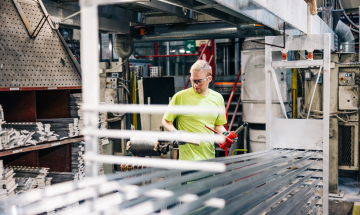Continuing growth requires a significant increase in new investment
“We are holding a promising hand of cards, but we must play them skilfully. We have waited for exports to pick up for years, and we must not interrupt the momentum by making mistakes in the early phase. We must keep our feet on the ground, as forecasts suggest that the structural problems of the economy will already slow down growth in 2018. The Finnish government and labour market organisations hold the trump cards now,” emphasised Jorma Turunen, CEO of Technology Industries of Finland, at the publication of the Economic Outlook for the technology industries on Tuesday.
In comparison to the corresponding period in 2016, the turnover of technology industry companies in Finland increased by 11 per cent between January and April. The companies that took part in the Federation of Finnish Technology Industries’ survey of order books reported that the monetary value of new orders between April and June was 25 per cent higher than between January and March and as much as 47 per cent higher than in the corresponding period in 2016. Growth was boosted by major ship orders, among other factors.
On the other hand, some 40 per cent of the respondents reported a drop in orders and order books during the spring and early summer. Moreover, around half of the Federation of Finnish Technology Industries’ member companies are either reporting losses or are performing poorly.
Jobs are now available in the technology industry, as recruitment activities also picked up in early 2017. At the end of June, the industry employed 296,000 people, or some 6,000 employees more than the 2016 average.
The scarcity of investment is a threat to welfare
Turunen considered it worrying, if predictable, that, according to the survey conducted by the Confederation of Finnish Industries, capacity is already fully utilised in the majority of industry-sector companies.
“This is positive, but also alarming, news after such a short upswing. If growth threatens to stall due to a lack of capacity at the outset, this does not bode well for the funding of the welfare society or for employment. It is a well-known fact that industrial production capacity has fallen by around a fifth since the recession,” Turunen said.
“The level of ambition must be raised considerably. We need new investment on a broad scale and at a rapid pace. We must do all we can to ensure that Finland is a competitive investment destination. We have a lot of catching up to do, as investments in our competitor countries have already exceeded the 2008 level."
Employment will be the top concern in labour market negotiations
According to Eeva-Liisa Inkeroinen, Executive Vice President of Technology Industries of Finland, employment and improving competitiveness will be the absolute top concerns in the labour market negotiations this autumn.
“Everyone knows that our economy is lagging behind. The question is how to take responsible action in this new situation, now that we are finally on a growth track. Restraint is now called for. The Competitiveness Pact improved competitiveness to some degree, but per the Bank of Finland’s calculations, we are still lagging behind our trade partners by 5-10 per cent. It is dangerous and premature to assume that there is a surplus for distribution, and such a discussion will not provide an answer as to how we can achieve sustainable growth in the future”, Inkeroinen stressed.
“The export-driven labour market model foundered, but hopefully the labour market organisations can still take act according to this approach. A strong export sector is in all our interests. A wage competition would be the worst thing that could happen to employment now. Holding salary negotiations at the company level is strongly supported by the recent survey of order books, which indicated that companies’ situations continue to vary considerably despite the overall improvement in market conditions.”
Greetings to the government budget session: major investment required in R&D
CEO Turunen also sent greetings to the ongoing government budget session.
“The public R&D financing received by Finnish companies in proportion to the GDP is only half of that invested by the Swedish government in the renewal of businesses, for example. Additional investment is required, as the decisions made by the government last spring are not even sufficient to compensate for the cuts made in recent years.
According to Turunen, annual R&D financing should be increased by EUR 200 million from the 2016 level. The capitalisation of universities should also be continued, and the availability of skilled labour and the high quality of vocational education should be ensured. Further training and re-training of the workforce as well as labour immigration should also be increased.
Every effort must now be made to support companies’ ability to invest. The government must also keep the promise given in the current government programme not to increase costs for the industry.
Additional information:
Jorma Turunen, CEO, tel. 050 044 5444
Eeva-Liisa Inkeroinen, Executive Vice President, tel. 040 089 4220
Matti Mannonen, Director, Industrial Policy, tel. 040 544 7047
Jukka Palokangas, Chief Economist, tel. 040 750 5469
firstname.lastname@techind.fi


